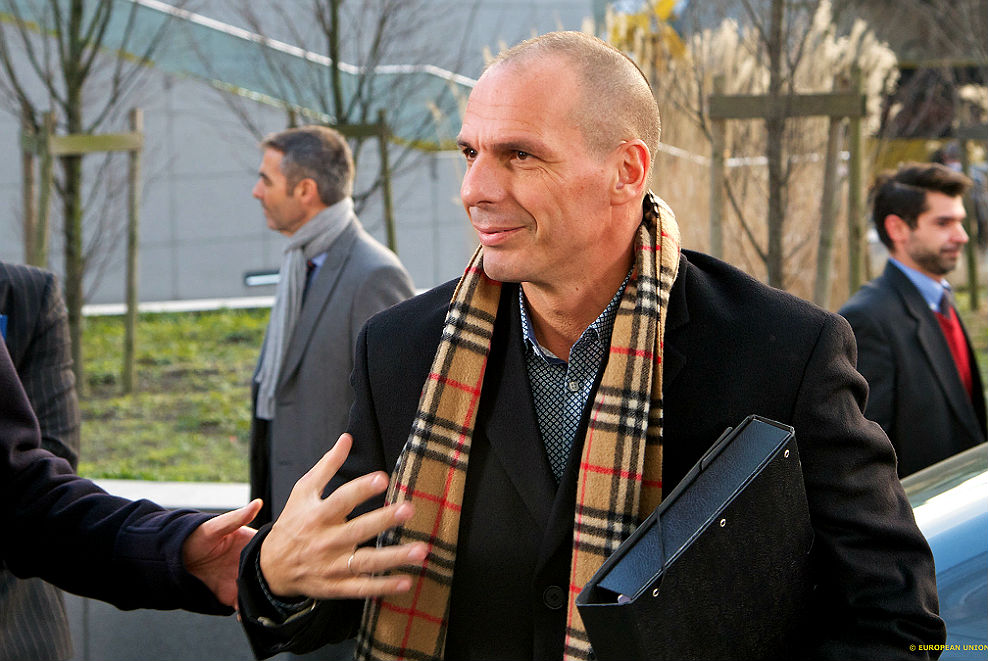Adults in the Room: My Battle with Europe’s Deep Establishment
By Yanis Varoufakis | Bodley Head | $35.00
If you studied economics at Sydney University in the 1990s, you might have had the good fortune to be taught in first year by a charismatic young lecturer who earned the nickname of the Greek God. Yanis Varoufakis, who in his youth bore some resemblance to John Travolta in Saturday Night Fever, liked teaching first year because it gave him the opportunity to divest students of the cut-and-dried assumptions they had acquired from the HSC course in economics.
Varoufakis had research interests in game theory, which he later tested in a venture with an innovative technology company named Valve. There, he and his partners experimented with management on the principle of “spontaneous order,” prioritising flexibility and self-determination in order to optimise freedom of initiative for employees. His sceptical view of game theory made him critical of any system based on manipulation and control.
Two decades on from his time at Sydney University, after a brief and turbulent period in 2015 as finance minister of the newly formed Syriza government in Greece, Varoufakis has resumed his career as an economics professor and public speaker. In a recent dialogue with Noam Chomsky at the New York Public Library, he characterised economics in the academy as a “mathematised religion,” an orthodoxy whose belief systems are insulated from the realities of market activity and financial transaction. As co-founder of DIEM 25, a reformist movement committed to a “surge of democracy” in Europe, he remains an indefatigable crusader for pragmatic human intelligence against systemic determination.
Adults in the Room is Varoufakis’s third major book on contemporary political economy. The first, The Global Minotaur (2011), concerns the changing role of America in the international economy following the global financial crisis of 2008. And the Weak Suffer What They Must? (2016) provides a historical context for the austerity in which Greece has become engulfed, tracing the macroeconomics of national debt back to the postwar era and the Bretton Woods agreement of 1944.
The three books constitute a kind of trilogy. The first leads up to an account of the first Greek bailout by the European Union. The second two revolve around the catastrophic debacle in which he became engulfed during his attempts as finance minister to negotiate with the European Union over the management of the Greek debt. It is as if he is compelled to revisit this traumatic epicentre – a zone of intellectual quicksand – and find the paths that led into it and may indicate a way out.
On one level, Adults in the Room, subtitled “My Battle with Europe’s Deep Establishment,” can be read as an autobiographical drama in which Varoufakis plays a contemporary Achilles, gladiator supreme and agile strategist, entering the fortress of the European Union as a champion of his people. Judging by the portrait photograph on the back of the book, Achilles is a role Varoufakis was born for. He’d be a potent physical and vocal presence on stage, as he is on the platform in so many international forums. Any theatre director seeking to cast a production of the Aeschylus trilogy Achilleis need look no further.
When he was chosen by the leader of the left wing Syriza party, Alexis Tsipras, to play a key role in a prospective Syriza government, the charisma was a bonus. It was Varoufakis’s credentials as an economic analyst that were paramount, supplemented by his sophisticated interest in game theory. By his own account, Varoufakis played a tough hand in negotiating his own involvement. At their first meeting in 2011, as he recalls it, he was concerned to “shake Tsipras out of his lazy thinking.” He advised him to get an English tutor and provided a firm lecture on the underlying principles they should adhere to.
It all sounds a little high-handed, reflecting as it does the assurance of someone who was already doing the rounds of international forums pronouncing on the state of the European Union in the aftermath of the 2008 Global Financial Crisis. Tsipras, though, proved to be a more agile thinker than Varoufakis initially gave him credit for. In the strategy tent, he and his key adviser Nikos Pappas agreed with Varoufakis on a five-point plan.
First, they must fend off any move by the European Central Bank to close the Greek banks. Second, the debts of the Greek state must be uncoupled from those of the banks, so that the government couldn’t be held accountable for bailout for money routed directly back to the banks in any bailout agreement. Third, they must “shout from the rooftops” that the new Syriza government was prepared to enforce strict fiscal discipline so that the country could begin to live within its means. But the fourth point was that humanitarian crisis must be avoided by imposing limits on austerity and introducing measures to assist those “below the absolute poverty line.”
Lastly, there was what might be termed the “Varoufakis special,” a “modest proposal” on which he had been working for some years in collaboration with American economist Jamie Galbraith and former British Labour MP Stuart Holland. This proposed a series of measures for rendering the eurozone viable in the continuing fallout from the global financial crisis. By putting this plan forward, the Syriza government would emphasise that their determination to release the Greeks from “debtor’s prison” was part of a more broadly conceived agenda to strengthen the European Union.
Varoufakis wanted no rash threats of Grexit, but he and Tsipras were agreed on the need to retain it as an option of last resort. As such, it was a key element in the bargaining strategy, the failsafe measure to ensure that the Greek people would not be subjected to another phase of “Bailoutistan,” the regime of debt management that had left three out of four households without employment and some 90 per cent of the unemployed without any form of financial assistance.
As the chosen emissary, Varoufakis was primed to compromise, adapt and collaborate on any reasonable terms. At the bottom line, though, he was the representative of a left-wing government voted into office by an electorate desperate to shake off the misery of ever-harsher austerity measures. In the early chapters of the book, he describes walking through the crowds of protesters who took up almost permanent residence in Syntagma Square outside the Greek parliament in the later, crisis-ridden years of the Papandreou government. Now, duly elected as a member of the government and invested with the critical responsibilities of the finance ministry, he is seen as champion of their cause.
At this stage, with Syriza taking office on the back of a rapid ascent in the polls, there is every reason for those crowds to have confidence in their finance minister. Varoufakis has the natural authority of someone who knows what he is talking about and whose principles have been forged in the sternest metal. As a speaker he’s charming, quick-witted, and fiercely cogent. As an economist, he’s rational and pragmatic.
But whatever his own capacities, they were sorely mismatched against those of the European establishment. Confidence was Varoufakis’s Achilles heel. It inspired a quixotic attempt to pitch clarity against obfuscation, reasonable argument against arbitrary determination, logic against absurdism. This was not, to use one of his own favourite phrases, going to end well.
His account of what transpires as he penetrates to the inner circles of power play in Brussels is based largely on recordings he made of the meetings. Chunks of verbatim dialogue fill out the pages of the book, and as he proceeds from one exchange to another, relentlessly insisting on the contrariness and illogicality he is encountering, it is as if the dramaturgy of Aeschylus is giving way to the absurdist scenarios of Alice Through the Looking Glass.
Anyone with a sceptical view of game theory would surely find a kindred spirit in Lewis Carroll. Carroll’s Alice stories feature playing cards, chessboards, a game of croquet and the famous language game with the domineering Humpty Dumpty, who declares he can make words mean what he chooses them to mean. “The question is,” he says, “which is to be master – that’s all.” Varoufakis finds himself dealing with people who have mastered the principles of economy in similar terms.
The three institutional players who have direct control over the Greek economy – “the troika” – are the European Commission, or EC, the European Central Bank, or ECB, and the International Monetary Fund, or IMF. As in Lewis Carroll’s world, it is not that there is no logic among them, more that they have adapted logic to work quite independently of any kind of common sense. Their bailouts involve a range of imperatives that Carroll’s Red Queen might have devised.
The ECB grants insolvent Greek banks the right to issue IOUs to the value of €5 billion. As no one wants to deal in these, they take them to the bankrupt state, which serves as their guarantor, and then use them as collateral for new loans from the Central Bank of Greece, which is controlled by the ECB. Lost already? But there’s more.
With permission from the Eurogroup (composed mainly of the finance ministers from EU member countries), the ECB issues real cash loans to the Greek banks for €3.5 billion, or 70 per cent of the value of the IOUs, while the Greek Treasury, also with approval from the Eurogroup, issues IOU bills for roughly the same amount. The bankers can now use their new cashflow to buy the state IOUs, so providing the Greek government with the cash to pay off debt to the ECB.
Bailout loans were thus made to serve the interests not of the Greek nation, and certainly not of the Greek people, but of the troika and the most powerful players in the bailout game, France and Germany. In 2011, French and German banks drove the terms of the loan by taking a high stake in it themselves – 20 per cent and 27 per cent respectively, with the remaining 53 per cent underwritten by smaller countries. Over the next two years, France and Germany managed to offload most of their own liability, leaving the debt burden to the taxpayers in smaller economies.
“Socialists sooner or later run out of other people’s money,” according to Margaret Thatcher’s dictum, but when it comes to spending other people’s money, governments pursuing neoliberal goals, and their billionaire backers, take the practice to a whole new level. At the same time, they get to control other people’s governments.
The troika’s bailout strategy is essentially a plan to force Greece to take loans it cannot hope to repay, in order to shackle the Greek government to a set of policies that will ensure a continuous flow of funds to the banks. By the terms of agreement, half the bailout goes to the banks, but the government takes liability for all of it. Fierce and unrealistic repayment schedules to the IMF are enforced through constant oversight of the Greek economy by troika officials. Forced and indiscriminate sale of national assets is the solution when there is no money to make the repayments.
All this leaves the Greek people in a state of near desperation, with radical cuts to even the lowest and most essential pensions, catastrophic levels of unemployment and the loss of national resources that might help to rebuild the economy. The challenge is to stave off the imposition of another loan under terms that will continue to crush the economy, which is showing signs of at least the capacity to recover. But an outright refusal to accept bailout would mean the immediate closure of the Greek banks by Mario Draghi, president of the ECB.
Any attempt to unravel the higher-order nonsense of eurozone finance involves dealing with key office-holders who at times present themselves as entirely reasonable and intelligent human beings. But in looking-glass world, “nohow”and “contrariwise,” stock responses in the dialogue of Tweedledum and Tweedledee, always seem to win out over any moves towards solution and agreement.
It is Christine Lagarde, managing director of the IMF, who gives Varoufakis his title when she insists that a way forward can only be found with “adults in the room.” But Varoufakis also tells of how, in a late-night conversation, Lagarde told him that he was entirely correct in his assessment of the logical impossibility of the bailout terms. Yet he would have to agree to them; the EU had invested so much political capital in the “extend and pretend” strategy that any backdown was impossible.
Varoufakis has told that late-night story many times, in public talks and in his previous books, where it is presented as a watershed moment. This is a world in which logic, reason and mathematics are weapons of no value. Forget economic rationalism. That is not their game at all.
This is vividly illustrated towards the end of the book, in a scene in which Wolfgang Schäuble, the German finance minister who has been presented through most of the narrative as the man in charge of the thumbscrews, comes across with some off-the-record advice: the Greek government should indeed withdraw from the eurozone, and if it does so, he will undertake to ensure that it is funded for the period of transition back to the drachma.
That proposition comes to nothing. The dialogue goes up to the next political level and Tsipras, in discussion with Angela Merkel, finds himself manoeuvred into an endgame in which he seems to lose track of whose side he’s playing for. Though he remains in apparent solidarity, he now seems to be undermining every move Varoufakis tries to make, and Varoufakis is made to appear the cause of the debacle. Key members of the Tsipras government become hostile; assistants who have been his staunch allies in the negotiating process are replaced with adversaries.
One of the climactic scenes in the Achilles story comes when the Greek hero drags the body of his slain enemy Hector behind a chariot, watched by the crowd. It’s the final humiliation, transforming the athletic physique of a warrior into a gory mess. In the media age, we have other ways of achieving an equivalent effect. Television cameras and tabloid headlines can strip a public figure of all dignity and credibility, as Varoufakis learned from experience.
His constant round of public talks, and the publication of this “tell all” book, might be seen as his bid for vindication, or even revenge. If his reputation was temporarily and spectacularly trashed in the media, he can do a slower, fuller and more sophisticated hatchet job on the EU officials and organisations responsible for his defeat.
If you read it this way – as the story of Achilles in a looking-glass world – the book can get rather wearing. It’s over 500 pages long, with scene after scene in which Varoufakis seems to go in holding the lamp of justice and reason and come out covered in confusion. Was it really like that? Surely he must himself have gone about things the wrong way in many of these situations? No doubt. No doubt the story – or the many stories that make up this sorry history – could be told in other ways by other people who were involved.
By the time I came to the end of his account, though, this was not at all the way I was looking at it. Whoever was in the right or the wrong at any stage of the process, wherever one might draw the line between reason and a monstrous culture of sophisticated nonsense, one thing is clear: the effect on the Greek people, and on the new young government in which their hopes were invested, was devastating.
Equally clear is that the culpability for this lies not with Varoufakis, or the Syriza government, but with the EU and its peak bodies. Tsipras is still embroiled in futile “negotiations” over the bailout. His government was forced to pass another suite of austerity measures only a few weeks ago. Opposition leader Kyriakos Mitsotakis, one of Varoufakis’s most strident critics, declared that “our country is being turned into an austerity colony.”
Approval ratings for Tsipras and Syriza have plummeted, and they are badly trailing the conservative opposition in the polls, but Mitsotakis is in no position to do any better. The Greek people have been trying to vote their way out of austerity since 2010, but to no avail. In Syriza, they backed a government committed to tax reform and a raft of responsible economic measures, with a plan for growth. But Tsipras has been able to deliver on virtually none of the policies that got him elected.
Fundamentally, Adults in the Room is a book about political economy. The wider historical context in which Varoufakis is able to place his own experiences makes it more than a narrative of self-vindication. As his previous books have demonstrated, he is a superb historian of political economy and brings enormous background knowledge to his critique of neoliberalism.
The global free-market credo, with all the high-end wheelings and dealings it has led to, produces a way of thinking that makes austerity for the people an inevitable consequence. “There is no alternative,” as Thatcher was fond of saying, but that very expression is a way of locking in thought processes.
Austerity is the cul-de-sac of neoliberalism. The Greeks can’t vote their way out, but the British may be about to vote their way into it. If we really believe there is no alternative, we all wind up there, sooner or later, with an inevitability that is the cynical modern equivalent of the fatalism expressed in Hellenic tragedy. Whatever his shortcomings may have been during his adventures in the looking-glass world of eurozone politics, Yanis Varoufakis is an implacable warrior against inevitability. •




